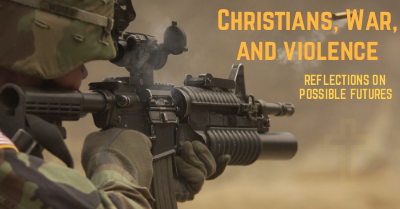|
My blog posts revolve around my interests and vocation as a historian: the intersection of history and contemporary church life, the intersection of history and contemporary politics, serendipitous discoveries in archives or on research trips, publications and research projects, upcoming conferences, and speaking engagements.
I sometimes blog for two other organizations, the Canadian Baptist Historical Society and the Centre for Post-Christendom Studies. The views expressed in these blogs represent the views of the authors, and not necessarily those of any organizations with which they are associated. |
|
“You may not be interested in war, but war is interested in you.” Leon Trotsky Sadly, those words of Trotsky apply today as much as in his day. Whether we identify with the just war tradition, or the pacifist tradition, or some other tradition, there is no escaping the fact that the world is a violent place and that such violence all too often intersects with our lives.[1] The modern world is a dreadfully violent place. Estimates of deaths caused by war in the twentieth century range between 100-200 million; the wide range is partly due to how one counts, but also due to the fact that genocides and civilian deaths are difficult to document.[2] No matter how you count it, it was the bloodiest century in human history in terms of sheer numbers of war-related casualties.[3] Hopefully the twenty-first century does not break that infamous record, but there is no guarantee it will not. Currently there are dozens of global conflicts, with others looming on the horizon.
Just how are Christians to think about such threats to life and limb?
This blog series entitled “Christians, War, and Violence: Reflections on Possible Futures” is intended to provide information to help make informed decisions on vexing issues. My emphasis on informed decisions is based on the pathetic record of how Christians have often come to their decisions. Sadly, what passes for much (most?) of Christian commentary is spent trying to find where this or that event can be found in the book of Revelation, counting years from the book of Daniel to make sense of dates today, identifying why this or that leader is the anti-Christ, or uncovering why what is really going on is some grand conspiracy of Jesuits, Templars, Illuminati, Masons, or some other supposedly shadowy and nefarious organization. Vacuous, shallow, uninformed, and ultimately detrimental, such commentary is not helpful in making decisions that have a significant bearing on the real world. And as much as I value reading the Bible (I am, after all, a Christian), it is obvious that the Bible does not have a verse for every issue we face. For instance, no Bible verse addresses the use of land mines – should they be used? If so, what kinds and where and when? Are cluster bombs a legitimate weapon? Should lasers be used to blind soldiers? What about unmanned drones and artificial intelligence – should drones be allowed to make decisions on the battlefield? Are China’s boundary claims in the South China Sea just? Is NATO’s eastward advance in Europe wise? The list goes on. My point is simply to say that thinking about issues of war and violence require more than finding a Bible verse to settle the issue. That said, undergirding a distinctly Christian reflection on these matters requires a robust biblical and theological grounding that brings to bear the rich resources of the faith on vexing issues, or what I call “possible futures.” The subtitle refers to “possible futures” – and my aim is to identify trends and trajectories, and stress the need to be aware of what may be just over the horizon. Here are some of the main categories of issues to be addressed:
The next blog entitled “Fake News: Media, War, and Violence” starts our journey by considering how we can sift through the noise of media to know what is going on in the world. And remember, since war is “interested in you” it is time for you to be interested in war. [1] I am not going to argue whether or not a Christian can be a soldier – I recognize that as a matter of Christian conscience, and will leave it at that. I have written a book on that subject, and it should be out in a few years if you really want to know what I think on the matter. [2] http://necrometrics.com/all20c.htm [3] Ian Morris argues that despite the rise of horrific numbers of deaths in the world wars, the actual deaths per thousand has progressively decreased since the Stone Age. See Ian Morris, War! What Is It Good For? Conflict and the Progress of Civilization from Primate to Robots (New York: Picador, 2014), 7-15.
0 Comments
Leave a Reply. |
Archives
May 2024
|

 RSS Feed
RSS Feed
